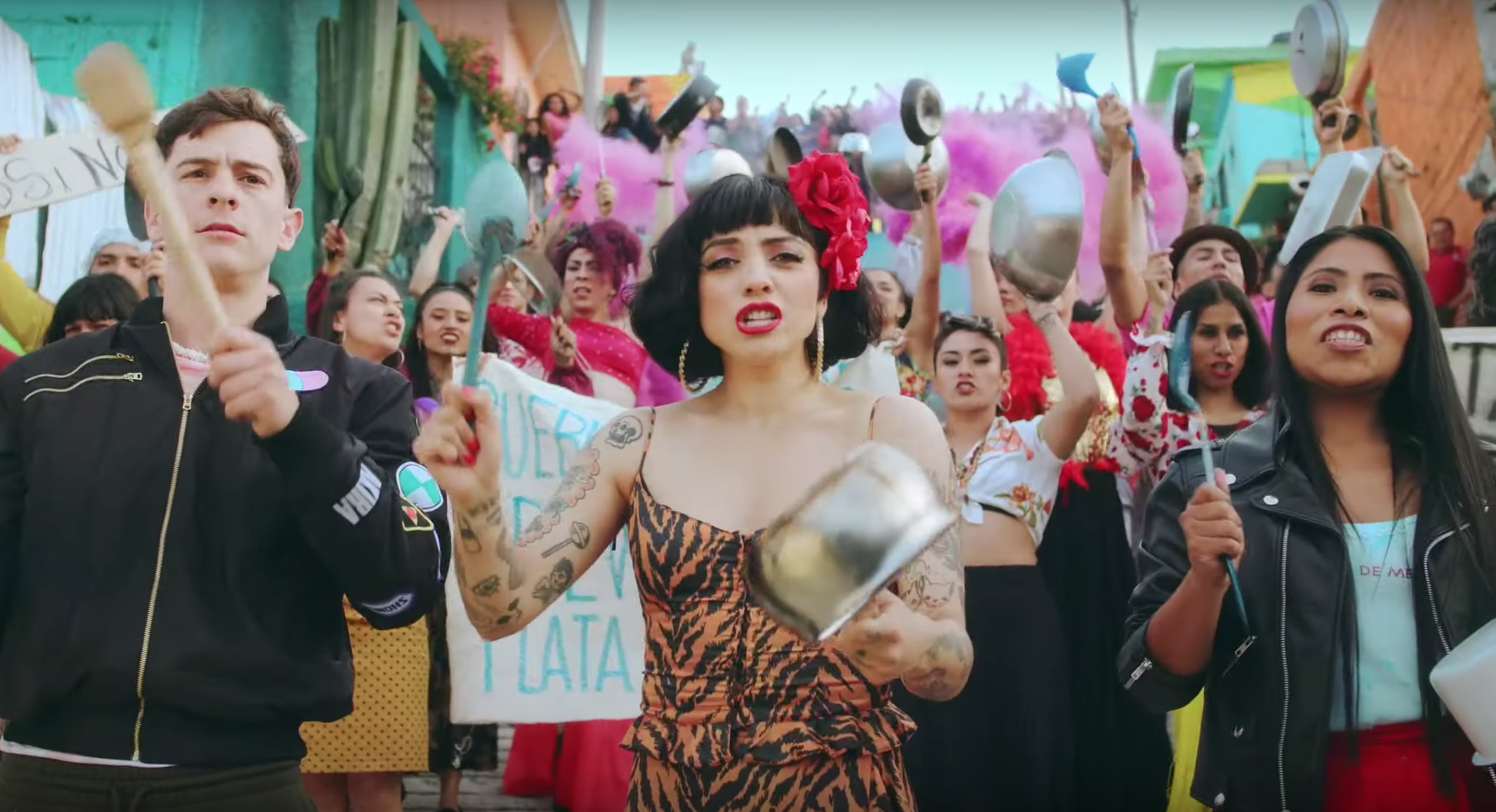
Plata ta tá: Mon Laferte's Protest Reggaeton
"I got into reggaeton, and even my ass moving, so I can send you the message again", says the new song by Mon Laferte, which seems to be addressed to Sebastián…
Mon Laferte "got into reggaeton" the same day she uncovered her chest at the Latin Grammy Awards to make us see the immense pain she had in her face and body: "In Chile, they torture, rape and kill”.
That same day the song "Plata ta tá" was published on digital platforms, in association with the Puerto Rican singer Guaynaa. But everyone was busy looking at her breasts and the song went rather unnoticed; until December 5, when the video came out, and in four days has accumulated almost five million views.
The video, which in principle looks like any reggaeton video, is full of allusions to the social explosion that has taken place in Chile (many of these elements are easily transferrable to the rest of the region): the dancers wear bulletproof vests or hoods that have been modified with carnival colors, the choreographies include gestures of money and end with raised fists as a sign of struggle, the environmental smoke (which could also be associated with tear gas) is tinged with purple, the color of the fight against violence against women, and green: green of the movement in favor of abortion rights in Chile and Argentina, of the marijuana that is smoked throughout Latin America. These images are interspersed with a man with a naked torso and a covered face that exhibits a white cloth that reads "Until living is worth it" and a scene in which all the dancers, with Mon Laferte, Guaynaa and Yalitza Aparicio at the head, strike pots.
As if that weren't enough, let's go to the lyrics:
"Plata ta ta tá" is the title and the chorus of the song because right there, in the money, is the background of the social outbursts that have taken place in Latin America: the enormous inequality in the distribution of wealth and the pauperization of the middle and lower classes.
"Those who always want money
(They've got their ass covered, those rats)
To the papitos of tie
This cat eats them with lemon".
"This cat eats them with lemon", sings Laferte without fear, like the Chileans who have taken to the streets "For what? If you took it from me," she says facing someone. It doesn't take much effort to imagine who.
"We're caleta
More than the paco'.
We are more choros, we fight without guanaco".
"Caleta", a word with multiple meanings in Latin America, in Chile means "a pile" and the "guanaco" refers to the pressurized water tanks that have been used to repress the protests.
"Record with the phone, phone, phone [...]
Me with money, or no money
In the end, I always do what I want
This generation has the revolution
With the cell phone, it has more power than Donald Trump."
This stanza refers to the enormous importance that the use of social media has had both to denounce abuses by police forces and in the call for marches and other acts of resistance.
RELATED CONTENT
"Even if they leave us limp
Even if they tear our eyes out."
The eyes, the loss of which has affected hundreds of people in Chile because of the rubber pellets of the carabineros and the containers of tear gas. This sacrifice, far from dissuading the demonstrators, has become a symbol of struggle.
"Let them come out, let them come out
Let them fight, let them fight
Let's make the world hear it
Pull out all the parts of the case
Let's see who's going to fuck with the Mapuches now."
The Mapuche community in Chile could not be subdued by the Incas or the Spaniards, but since the time of the dictatorship, they have been abused by the pauperization of their living conditions and the criminalization of their social claims. Now, their flag has become a symbol of struggle and rebellion against the neoliberal economic model.
"We take off our brassieres
We raise the handkerchiefs
Green as marijuana
The one the old lady sells.
That you can't afford the pension
But he's got a good heart
Clandestine marijuana
But how does the whole Latin America smoke it?"
"We take off our bras, we lift our handkerchiefs" [green] refers to the feminist struggle in Chile for the legalization of abortion and women's reproductive rights, which although in 2017 had the triumph of legalization in three cases (danger to mother's life, fetal unfeasibility, and rape), it is a right that has not been able to become effective for the majority of women.
With regard to clandestine marijuana, it should be noted that in Chile it is heavily penalized through Law 20,000, which establishes that those who manufacture, transform, prepare or extract narcotic substances (including marijuana) risk fines of between 40 and 400 UTM (Monthly Tax Unit, a unit for tax purposes and fines adjustable to the inflation that appeared during the Pinochet dictatorship) and 3 to 20 years in prison unless they prove it's for their personal consumption.
"I got into reggaeton
And I'll even move my ass
To send you the message again
So that you understand
Hey, plata-ta-ta
Piñata-ta-tá
Hey, we're not afraid
We're not afraid, no."
No "piñata", Piñera.











LEAVE A COMMENT: